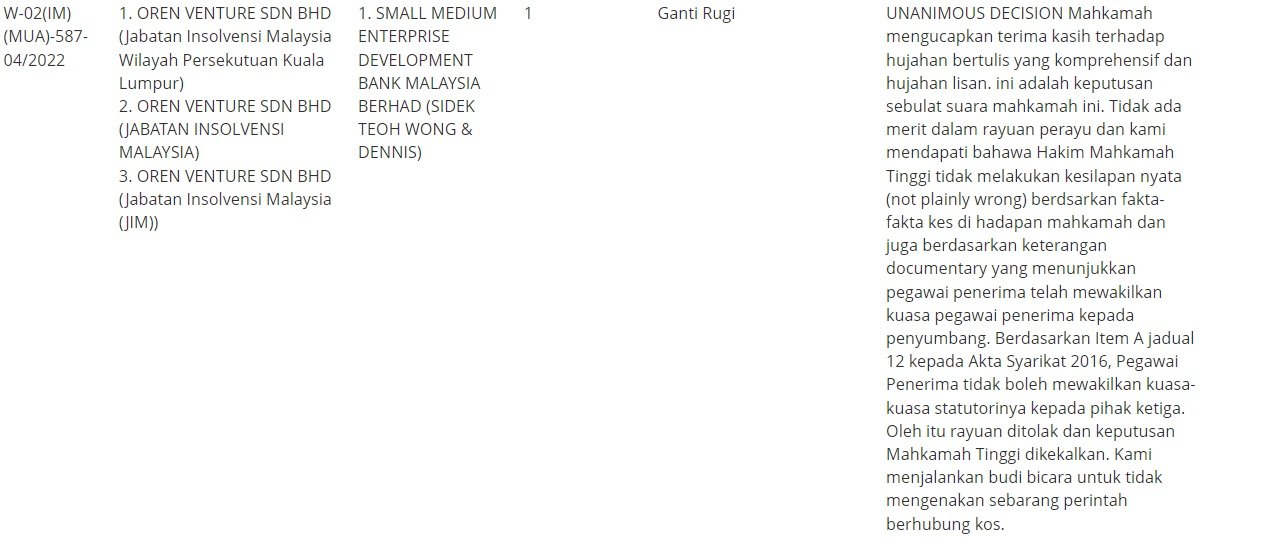


On 16 November 2023, the Court of Appeal in Oren Venture Sdn Bhd v Small Medium Enterprise Development Bank Malaysia Berhad (Court of Appeal Civil Appeal No. W-02(IM)(MUA)-587-04/2022) upheld the High Court decision (reported at [2022] 12 MLJ 247 and where I had written about it here).
Set out below is the extract from the Court of Appeal cause list website and with the Court setting out the brief grounds of decision (in the Malay language only). The full written grounds of decision do not appear available yet. I may write a fuller update once I have read the written grounds.
Brief Facts
In July 2020, SME Bank filed a legal suit against the company, Oren Venture, and the company’s directors. In May 2021, Oren Venture filed a second legal suit against SME Bank.
On 25 May 2021, Oren Venture was wound up by an Order of Court. The Court appointed the Director-General of Insolvency (DGI) as the liquidator.
A contributory of the wound-up Oren Venture obtained sanction letters from the DGI. The sanction letters stated that the DGI allowed the contributory to defend the first legal suit and to proceed with the second legal suit all n behalf of Oren Venture.
The High Court sought a preliminary determination on the following issue and answered it in the negative.
“Whether a liquidator of a wound-up company can issue a sanction or delegate his power under Item (a) of the Twelfth Schedule of the Companies Act 2016 to any other person to bring or defend any action or other legal proceedings in the name and on behalf of that company.”
Therefore, the DGI, as liquidator of Oren Venture, could not issue such sanction letters delegating the liquidator’s power to Oren Venture’s contributory.
On Appeal
The Court of Appeal upheld the High Court decision.
From the brief extract above, the Court of Appeal held that the liquidator in this case, being the Official Receiver, could not delegate the liquidator’s statutory power under item (a) Part I of the Twelfth Schedule of the Companies Act 2016. This item (a) reads:
“The liquidator may … bring or defend any action or other legal proceedings in the name and on behalf of the company.”
This decision in Oren Venture is the first appellate authority directly addressing this practice in Malaysia on a liquidator granting sanction for a creditor or contributory to continue legal proceedings on behalf of the wound-up company.
When the full grounds of decision are issued, I will also be interested to see if the Court of Appeal confine its decision to future applicability only (i.e. prospective overruling).
If there is no mention of that, the default rule would apply – this decision would have retrospective effect. That would then call into question all acts by a liquidator or delegating or providing ‘sanction’ to a creditor or contributory to continue or defend legal proceedings on behalf of the wound-up company.
Differing Application of the Oren Venture High Court Decision
We do not know if this decision will be subject to any Federal Court leave application and whether the Federal Court will have the opportunity to address this issue.
The Court of Appeal decision helps bring clarity but also causes uncertainty on the prior-issued sanctions by a liquidator.
Prior to this Court of Appeal decision, there were differing High Court decisions adopting or distinguishing the Oren Venture High Court principle.
- Ooi Kim Geik v Ng King Chong & Ors [2022] MLJU 3630: Declined to apply the Oren Venture principle. Upheld the validity of the sanction issued by the DGI for a contributory to continue with legal proceedings on behalf of the company.
- Sabah Forest Industries Sdn Bhd (Receiver & Manager Appointed) [2022] MLJU 3398: Followed the Oren Venture principle. Held that the DGI did not have the power to delegate nor sanction the Receiver & Manager to bring or continue legal proceedings.
- KL Landmark Development Sdn Bhd v Jalex Sdn Bhd [2022] MLJU 2449: Followed the Oren Venture principle. Held that the DGI did not have the power to sanction a third party to bring an action on behalf of the wound-up company. The Court application was found to be defective and dismissed.

Recent Comments